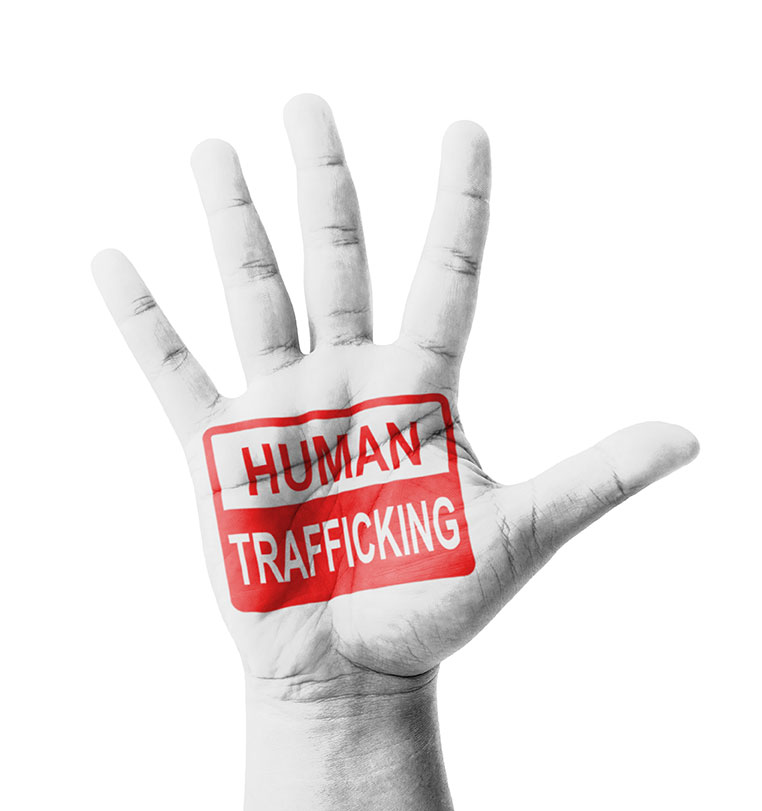Fighting Human Trafficking
Research shows more comprehensive – not harsher – legislation curbs human trafficking.

Though the majority of the American public believes human trafficking is a widespread problem, only 1 in 5 people believe it happens in their communities. (Photo © ijacky / AdobeStock)
Fighting Human Trafficking
Research shows more comprehensive – not harsher – legislation curbs human trafficking.
A federally funded research report shows that the severity of criminal penalties for human trafficking has no effect on the number of arrests and prosecutions for the crime.
“More comprehensive laws increase arrests and prosecutions for human trafficking, but harsher criminal penalties do not. In other words, it is more important that state human trafficking legislation be comprehensive across all categories rather than being extremely harsh in only one category,” wrote Vanessa Bouché, assistant professor of political science, along with two partners in the report’s summary.

Vanessa Bouché’s research shows that only some states are developing expertise in charging human trafficking offenders. (courtesy photo)
With a $339,000 grant from the National Institute of Justice, which is part of the U.S. Department of Justice, the three researchers examined U.S. anti-human trafficking efforts across the country for the report, “Identifying Effective Counter-Trafficking Programs and Practices in the U.S.: Legislative, Legal and Public Opinion Strategies that Work.” The report’s findings were based on more than two years of data collection and analysis of state laws, criminal prosecutions and public opinion.
Bouché and her research colleagues from Northeastern University and Colorado College found that the level of fiscal and human resources invested to combat human trafficking most significantly predict state-level arrests and prosecutions. Some remedies, especially civil action and safe-harbor provisions, resulted in more human trafficking arrests and prosecutions.
“What is perhaps most surprising is that harsher criminal penalties have no impact on the number of arrests and prosecutions for human trafficking across the states,” said Bouché. “These results suggest that, while harsher criminal sentences may be an ‘easy sell’ for state legislatures, it does not produce law enforcement outcomes. Instead, when legislatures put state resources behind combating human trafficking, it signals to law enforcement that this is a state priority.”
The researchers conducted an in-depth examination of state cases in which suspects were charged specifically under the state human trafficking statute. Identifying 479 state human trafficking prosecutions between 2003 and 2012, the study found that only a few states developed expertise in charging offenders. One state, California, charged 39 percent of all identified suspects in the data sample, while Texas charged 9 percent.
Bouché and her colleagues also examined U.S. public opinion on human trafficking. The findings revealed that 90 percent of Americans understand that human trafficking is a form of slavery, and more than 80 percent of the public has “some” or “a lot” of concern about it.
However, the researchers wrote that their finding showed “many [people] hold incorrect beliefs about human trafficking, including that human trafficking victims are almost always female (92 percent), is another word for smuggling (71 percent), always requires threats of or actual physical violence (62 percent), involves mostly illegal immigrants (62 percent), and requires movement across state or national borders (59 percent).”
While the findings revealed that more than half of the public believes that human trafficking should be a top government priority, the concern doesn’t translate into personal action.
“Our results indicate that the public has not made the connection between how their own attitudes and behaviors help or hinder the movement against human trafficking,” wrote the researchers. “Until we do, we can’t expect our efforts to stop it to succeed.”
In discussing an outcome of the public-opinion survey results, the researchers wrote: “While the public thinks that human trafficking happens in the U.S., they are less willing to say that it happens in their own community.”

Your comments are welcome
Comments
Related reading:
Features
Starpoint School’s Special Education
At age 50, the on-campus lab school is still giving students a chance to shine.
Features
Adam Fung’s Uncommon Arctic Adventure
The art professor is acting as an Arctic ambassador and filmmaker after his 19-day residency in the Far North.